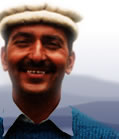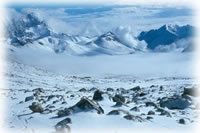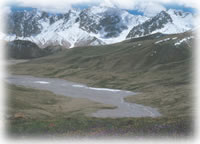 |
 |
||
 |
|||
|
RELATED THEMES environmental knowledge livestock politics social institutions OTHER LOCAL THEMES BACKGROUND |
environment
The key environmental issue discussed in many of the testimonies is the Khunjerab National Park and its threat to Shimshalis' relationship with and exclusive control of vast areas of pasture land above the village. Understanding the background to people's attachment to their surrounding environment and how this relationship manifests itself enables us to appreciate why the National Park is considered such a significant threat to Shimshalis.
Shimshal has its own calendar based on the position of the sun on the mountains around the village. Chughbai (Pakistan 13) is the expert on this calendar and gives an attractive and lengthy description of it in his testimony. Shimshalis have also made their mark on their surrounding environment by investing considerable labour and resources into constructing and maintaining paths, bridges and irrigation channels in order to navigate their challenging surroundings. In addition to the descriptions of difficult journeys, the harsh environment is illustrated by the number of narrators who have either themselves suffered an accident or who have a family member who has. One elderly woman recounts the following tragedy: "Once I was in Pamir and four [female] shepherds were in Ghujerab (another pasture). The shepherds from Ghujerab were going to graze the animals… They had to pass through a river gorge before reaching the next grazing place. One day when they were crossing the gorge they were hit by rock slides rolling down the mountain. All four of them died. One of them had a small baby who survived because the baby was at the hut at the time of the accident" (Pakistan 32). Other accidents include falling down crevasses, bridges breaking, and being swept down the icy glacial river. Several narrators also refer to severe floods in Shimshal caused by the bursting of a glacial lake above the village. Those who have experienced life in the city contrast this with the peace and beauty of Shimshal for which they have a deep attachment. It is the environment and "clean air" which Shimshalis miss most when they are away from the village. One narrator says that as students in Karachi, whenever he and his Shimshali friends got together they would always talk about the pastures and Pamir. There appears to be a certain romance attached to Pamir. One narrator sings a song about Pamir and another (Pakistan 5) describes his memories of time spent in Pamir: "We had named Pamir as wilayat (place of prosperity). We would live there with yaks… The riding of yaks and collection of the violets were the happiest events for us and we didn't even care for the food." quotes about environment"As we are the owners of this land, we have a centuries-long emotional and spiritual relationship with this land and we have the right to regulate and manage our resources. There is a sense of ownership and sense of place and certainly people (the community) have a strong feeling that the community must manage it in accordance with their own requirements." We use the firewood from our own jungle (forest). We have our own jungles. We irrigate our jungles on time and shrubs grow and gradually we cut them for making firewood. We use the firewood with great caution. "In former times firewood was delivered from the mountains; now the source is depleting rapidly because the population has increased… In olden times it was abundantly available along the trek leading to Pamir and we would easily meet the fuel requirements." "Shimshal is famous for its pasture (Pamir) because it is said that Shimshal is the place of butter and meat, and these things in such a large quantity cannot be found elsewhere in the area. And the mutton and beef of Shimshal is famous for its taste. These are all the famous things about Pamir, but we also have our personal agricultural fields in Pamir… and still we grow crops there. When it is constituted as a national park then I think we would be deprived of our land and our pasture and consequently we would become poorer… our yaks will be driven out of the area… Our friendly and peaceful environment will be destroyed and our women will no more go to Pamir and this will cause complete destruction of our community." "In my life time I witnessed the disaster of the bursting of the Shimshal [glacial] lake… about three times but one was really destructive as it washed away half of the village… It was summer season when the lake burst, people were busy with their agricultural activities; the high tides of the flood washed away our ripe crops and our fields, houses and gardens. At that time the army was deployed in Shimshal so they assisted the locals in dismantling their houses and shifting their belongings to the safe places. So it was the most destructive disaster I had ever experienced." "I wish that our land remains in our own hands and that we maintain our independence. Our lands should remain our own property. If the government took over its management then we would lose everything and we will be left with nothing. We will be limited to the village only. Our condition will be the same as has happened with the people of Sost and Morkhoon who have lost the propriety rights of their land." "Today we have free access to our landscape. There is no restriction, we go to the pasture with our livestock; we remain there the whole winter with our livestock. But if the government purchased the land for the National Park, then we will never enter our land again which we had possessed and safeguarded for centuries. I think it is extremely destructive for us… in Shimshal the women manage the pasture activities independently; they look after their livestock, fetch wood from surrounding valleys, regulate the grazing areas and collect dung cakes from the surrounding areas without any external interference. But if there is a National Park then they will no longer remain there." |
|
 Shimshalis have a strong connection to their surrounding environment based on the community's relatively isolated location and their dependence on it in terms of agriculture, livestock and tourism. Although the environment is rarely addressed as a separate topic, there is a strong sense across the testimony collection of Shimshalis' consciousness of, and attachment to their surrounding environment. One narrator (Pakistan 2) explains:
Shimshalis have a strong connection to their surrounding environment based on the community's relatively isolated location and their dependence on it in terms of agriculture, livestock and tourism. Although the environment is rarely addressed as a separate topic, there is a strong sense across the testimony collection of Shimshalis' consciousness of, and attachment to their surrounding environment. One narrator (Pakistan 2) explains:  In some testimonies it is the harshness of the environment which is described, especially in relation to people's journeys in and out of Shimshal in the past. In other accounts people refer to Shimshal with extreme fondness and describe the beauty of their surroundings, in particular, the pastures of Pamir.
In some testimonies it is the harshness of the environment which is described, especially in relation to people's journeys in and out of Shimshal in the past. In other accounts people refer to Shimshal with extreme fondness and describe the beauty of their surroundings, in particular, the pastures of Pamir.